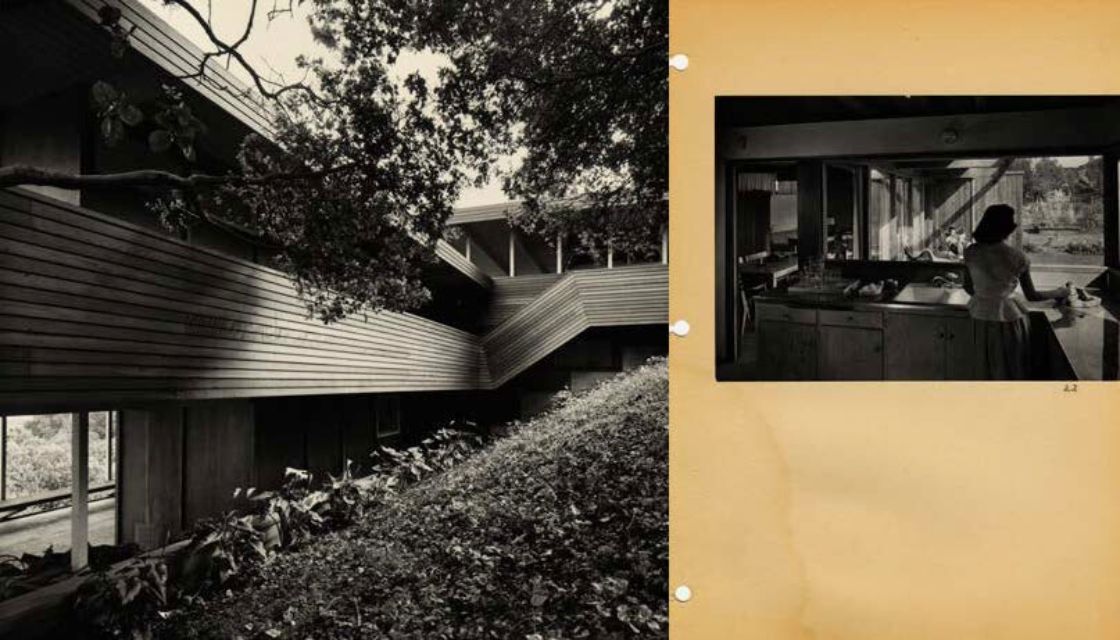Between History and Design: 20th-Century Asian American Architecture | Symposium
Presented in conjunction with the exhibition Modern Vernacular: Asian American Architects and the Built Environment of Postwar Northern California, this symposium brings together scholars from across the U.S. to explore the intertwined relationship between Asian American identities and the built environment.

Recent study of Asian American and Asian diasporic buildings and landscapes has brought into critical relief the roles of these communities in shaping the built environment in the United States and the broader diasporic sphere. The 2022 Society of Architectural Historians-Cooper Hewitt collaborative study on AAPI designers and architects and the March 2024 issue of the Journal of the Society of Architectural Historians on AAPI architectural histories have introduced new theoretical sensitivities and methodological alternatives for seeking an alternative paradigm of architectural history beyond the Euro-American canon.
Building on this growing field, the symposium Between History and Design dives into the socio-spatial histories of Asian American communities and designers, exploring the intertwined relationships between Asian American identities and the built environment in their many constitutive affinities and historical multitudes.
With a diverse group of scholars from various disciplinary backgrounds, this symposium also seeks to create a dynamic interdisciplinary dialogue between architectural history, Asian American studies, critical pedagogy, Asian studies, and diaspora studies.
Registration requested.
Keynote Speakers
Lynne Horiuchi, Independent Scholar
Lynne Horiuchi is an architectural historian who received her PhD from the University of California, Santa Barbara. Her work is cross-disciplinary, examining concepts of imprisonment, race, space, mobility, everyday racism, and civil justice. She is currently writing a book on the production of the prison camps built for Japanese Americans, Dislocations and Relocations: Building Prison Cities for Japanese and Japanese Americans during World War II (University of Washington Press, forthcoming). She has published widely in journals and collections on racial covenants, urban development, racialized sites, spatial jurisdictions, national belonging, and artistic representation in prison camps. She was named a National Endowment of the Arts Fellow at MacDowell Colony and has won numerous notable awards, including National Endowment for the Humanities grants.
Hongyan Yang, Boston College
Hongyan Yang (杨鸿雁) is a core fellow/visiting assistant professor in history, (digital) humanities, comparative migration and ethnic studies at Boston College. Trained as an urban planner, cultural geographer, and architectural historian, she researches the underexplored spatial and material dimensions of Asian American experiences. She is currently working on several research projects, including the book Landscapes of Resistance: Chinese Placemaking Across the Pacific, a museum project documenting the contributions of American architects of Chinese descent (in collaboration with the Society of Architectural Historians and the Copper Hewitt, Smithsonian Design Museum), and an oral history project, “Places of Their Own.” In addition to her research, she has developed community-centered teaching in Asian and Asian American architecture, as well as professional practice in historic preservation.
Panelists
Esa Syeed, California State University, Long Beach
Esa Syeed is associate professor of sociology at California State University, Long Beach. His research and teaching are shaped by concerns for educational justice and grassroots change.
Judy Tzu-Chun Wu, UC Irvine
Judy Tzu-Chun Wu is Chancellor’s Professor of History and Asian American Studies at the University of California, Irvine. She also serves as faculty director of the Humanities Center and associate dean in the School of Humanities of Research, Faculty Development, and Public Engagement. She is the author of three books and is currently researching the life and vision of architect Edith Yang.
Kalpanee Jayatilake, University of Cincinnati
Kalpanee Jayatilake is a PhD student in architecture at the University of Cincinnati and a chartered architect in the U.K. and Sri Lanka. She earned her MPhil in architecture and urban studies from the University of Cambridge. She has taught at the University of Moratuwa, Sri Lanka, and at the University of Cincinnati. Her research explores the intersections of environmental design, well-being, material signification, and fractal poetics in architecture. Kalpanee has conducted a comparative, historical analyses of environmental imagination in the works of Minoru Yamasaki and Geoffrey Bawa; an investigation into the architectural signification of wood in premodern Japanese temples and its reinterpretation in the contemporary works of Kengo Kuma; and a study of the fractal poetics in Geoffrey Bawa’s Steel Corporation Building in Oruwela, Sri Lanka.
Nathaniel Walker, The Catholic University of America
Nathaniel Robert Walker is professor of architectural history in the School of Architecture at the Catholic University of America. He earned his PhD at Brown University and has taught and published on architecture, cities, concepts of beauty, social reform, and dreams of the future. He is the author of Victorian Visions of Suburban Utopia: Abandoning Babylon and coedited Suffragette City: Women, Politics, and the Built Environment and, most recently, Architectures of Slavery: Ruins and Reconstructions, as well as other articles and book chapters.
Y. L. Lucy Wang, Syracuse University
Y. L. Lucy Wang is an architectural historian, curator, and educator researching Asia’s empires from maritime exchange to postcolony, with a particular interest in land administration and scientific knowledge. Her current book project, Contagious Places, Curative Spaces: Disease and Architecture in Modern China, 1894–1949, examines biomedicine as a through line in the architecture of greater China. Wang received her PhD from Columbia University’s Department of Art History and Archaeology. In 2021–2022, she was part of the curatorial team of MoMA’s The Project of Independence: Architectures of Decolonization in South Asia, 1947–1985.
Free and open to the public. Registration requested.
Supported provided by the Joan Draper Research Endowment (Department of Architecture), the Center for Race and Gender, and the Mary C. Stoddard Lecture Fund (History of Art Department).
If you require accommodations to fully participate in this event, contact betsyfr@berkeley.edu at least 10 days prior.